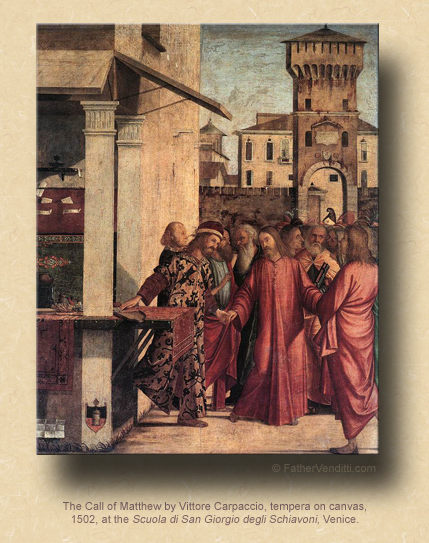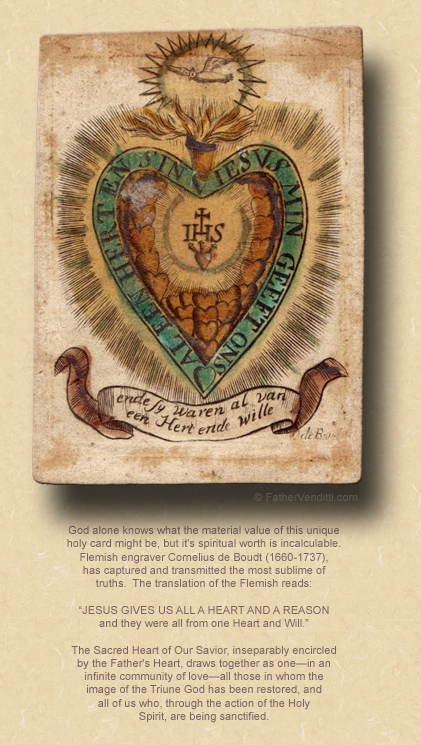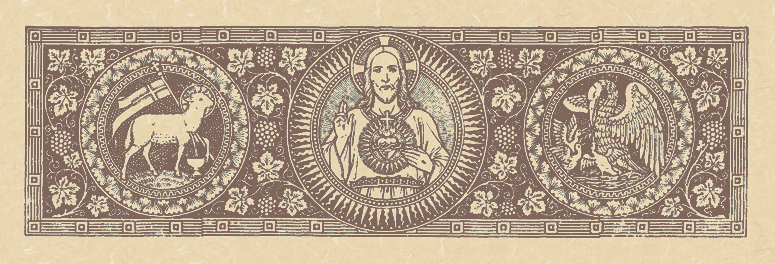Our Lord Will Always Meet Us Halfway; He Just Won't Let Us Stay There.
The Thirteenth Friday of Ordinary Time.
Lessons from the primary feria, according to the ordinary form of the Roman Rite:
• Genesis 23: 1-4, 19; 24: 1-8, 62-67.
• Psalm 106: 1-5.
• Matthew 9: 9-13.
The Third Class Feast of Saints Cyril & Methodius, Bishops & Confessors.*
First lesson and Gradual from the common of Confessors "Sacerdótes tui…" for a Confessor Bishop, third lesson from the proper, according to the extraordinary form of the Roman Rite:
• Hebrews 7: 23-27.
• Psalm 131: 16-17.
• Luke 10: 1-9.
The Fourth Friday after Pentecost; and, the Feast of Our Venerable Fathers Thomas of Maleum & Acacius.
Lessons from the pentecostarion, according to the Ruthenian recension of the Byzantine Rite:
• Romans 16: 1-16.
• Matthew 13: 4-9.
FatherVenditti.com
|
 7:33 AM 7/7/2017 — Today is First Friday and, as there is no saint attached to today’s date on the calendar, we are able to offer the Votive Mass of the Sacred Heart. Following Holy Communion, we’ll expose the Blessed Sacrament and pray together the Litany of the Most Sacred Heart, with the rest of the time yours to converse with Our Blessed Lord, concluding with Benediction at 1:30. 7:33 AM 7/7/2017 — Today is First Friday and, as there is no saint attached to today’s date on the calendar, we are able to offer the Votive Mass of the Sacred Heart. Following Holy Communion, we’ll expose the Blessed Sacrament and pray together the Litany of the Most Sacred Heart, with the rest of the time yours to converse with Our Blessed Lord, concluding with Benediction at 1:30.
I remember hearing a homily in college on the call of Simon and Andrew wherein the priest tried to tell us that, because the Gospel doesn't tell us everything, we can presume that Simon and Andrew had already known Our Lord for some time before He called them, so they weren't simply following Him blindly. I'm not sure why he found the concept of following Our Lord blindly offensive, especially as that's what makes the episode meaningful. In fact, I think it's likely that Jesus called a whole slew of people to follow Him in the early days, and the Evangelists tell us about those who actually responded, with an emphasis on those who responded immediately and without question.
If we compare the call of Simon and Andrew to the call of Matthew, we notice that, in both instances, these men are busy at their jobs when Our Lord approaches them; the one difference is that, in the case of the two brothers, the job at which they work is rather innocuous;—there are no moral or political implications to being a fisherman—but, in the case of Matthew, his position as a customs official and tax collector adds a new dimension to his call: he's a hated man. Some Scripture translations call these men “publicans,” that is, public officials; they were hated because, just like they do today, they lived rather high off the hog, profiting from their offices by means of the taxes they collected from their fellow Jews on behalf of the Romans. In fact, in the minds of many Palestinian Jews, they were traitors, since they were working for the enemy. That's why the Pharisees were so scandalized by Our Lord wanting to call Matthew.
Matthew, of course, responds very generously to Our Lord's call, and shows his gratitude by throwing a party. The reason for his joy at being called by Our Lord we may never know, but I tend to think that, like most people who spend their lives scampering after worldly profits, he's found that everything he's accumulated has left him empty inside.
The last thing Our Blessed Lord would want is a fancy banquet, but He goes anyway, because He's willing to meet Matthew half-way. Matthew may have responded to Our Lord's call immediately, but his conversion of heart is in no way complete, which is why he thinks that offering Our Lord a material reward in return for his call is a good idea.  Our Lord accepts it because He's willing to take Matthew where he's at. He's not willing to leave Matthew where he's at, as we know; but, at least for now He takes him as he is, and this is what the Pharisees didn't quite understand. Our Lord's response to them is as familiar as any verse in Sacred Scripture: “It is not those who are in health that have need of the physician, it is those who are sick” (Matt. 9: 12 Knox). Consoling words, to be sure, but which must be understood within the context of the full import of those words: What good is a doctor who commiserates with you over the fact that you’re not feeling well, but then does nothing to effect a cure? And, more often than not, the cure requires us to do inconvenient things we were not doing before. Our Lord accepts it because He's willing to take Matthew where he's at. He's not willing to leave Matthew where he's at, as we know; but, at least for now He takes him as he is, and this is what the Pharisees didn't quite understand. Our Lord's response to them is as familiar as any verse in Sacred Scripture: “It is not those who are in health that have need of the physician, it is those who are sick” (Matt. 9: 12 Knox). Consoling words, to be sure, but which must be understood within the context of the full import of those words: What good is a doctor who commiserates with you over the fact that you’re not feeling well, but then does nothing to effect a cure? And, more often than not, the cure requires us to do inconvenient things we were not doing before.
As we mark this day traditionally dedicated to the Most Sacred Heart of Jesus, we are not only consoled by Our Lord's words as they apply to ourselves, but how they inspire us to regard those around us with increased charity. Those we meet along the way may not be where they should be—or where we think they should be—on their own journey toward Christ; but, assuming that we're not fooling ourselves regarding our own progress:—which is always a possibility—if Our Lord is willing to take them as they are, at least initially, then so should we. After all, one does not inspire conversion in others by berating and lecturing them, but by befriending them and encouraging in them a desire to change. If Jesus had looked at Matthew collecting his taxes and said, “I'm not interested in him; he's not what a want,” then the Church would have been deprived or a great Apostle and an entire Gospel.
So, during this Mass and the Holy Hour which follows, let us appeal to our Blessed Lord to help us encourage change in others by an increase in the practice of the virtue of charity.

* The founders of all Eastern Churches of the Slavonic tradition, these two brothers went as missionaries from Byzantium to Bulgaria, Moravia and Bohemia. The were consecrated Bishops by Pope Adrian II when they visited him to receive approval for their liturgical books which were written in the vernacular language of Eastern Europe, for which Cyril invented the script. Cyril died in Rome, however, in 870, and Methodius returned alone to the Slavonic countries, dying in 886.
|

